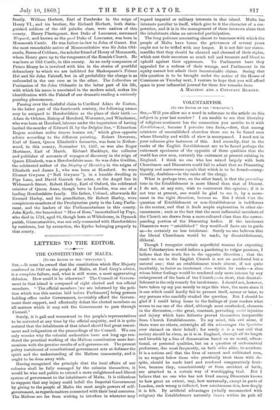LETTERS TO THE EDITOR.
THE CONSTITUTION OF MALTA.
. [TO THE EDITOR OF THE SPECTATOR."] SIR,—It must be owned that the constitution which Her Majesty conferred in 1849 on the people of Malta, at Earl Grey's advice, is a complete failure, and, what is still worse, a most aggravating delusion. How could it be otherwise? The Council of Govern- ment in that island is composed of eight elected and ten official members. "The official members [we are informed by the peti- tion which was this session laid before Parliament] being persons holding office under Government, invariably afford the Govern- ment their support, and effectually defeat the elected members on all matters which it may suit the Government to pass through Council."
Surely, it is gall and wormwood to the people's representatives to be outvoted at any time by the official majority, and it is quite natural that the inhabitants of that island should feel great resent- ment and indignation at the proceedings of the Council. We can only wonder why the colonial authorities have not long ago ren- dered the practical working of the Maltese constitution more har- monious with the genuine results of self-government. The present paltry instalment of constitutional government sets at defiance the spirit and the understanding of the Maltese community, and it ought to be done away with. Having recognized the principle that the local affairs of our colonies shall be fully managed by the colonies themselves, it would be wise and politic to extend a more enlightened and liberal system of government to the inhabitants of Malta. It is ridiculous to suppose that any injury could befall the Imperial Government by giving to the people of Malta the most ample powers of self- government, as regards matters connected with their local concerns. The Maltese are far from wishing to interfere in whatever may regard imperial or military interests in that island. Malta has interests peculiar to itself, which give to it the character of a cor- poration, and it is in the management of these interests alone that the inhabitants claim an extended participation.
The long patience amounting almost to tameness with which the people of Malta have borne the grievances of several years ought not to be trifled with any longer. It is not fair nor states- manlike that they should be cheated and choused of their rights, which cost their ancestors so much toil and treasure and blood to uphold against their oppressors. To Parliament have they appealed for a redress of their wrongs, and Parliament in its equity cannot but admit their incontestable claims. Seeing that this question is to be brought under the notice of the House of Commons on Tuesday next, I venture to hope that you will afford space in your influential journal for these few remarks from
A MALTESE AND A CONSTANT READER.






























 Previous page
Previous page